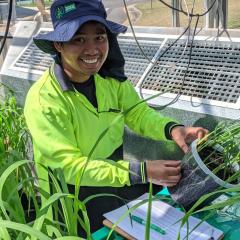Physiological and genomic analysis of root-related and cold tolerance traits, and their relationship to grain yield of rice (Oryza sativa L.) in an aerobic production system
Aerobic rice production (AP) system is a promising alternative to traditional flooded culture by using less water and labour, although the knowledge base relevant and specific to AP is still limited. This project aims to characterise the advantage brought by the development of rice crops with improved rooting system architecture (narrower, deeper roots) through physiological characterisation of key traits. Additionally, cold tolerance is a required component for AP production and hence genomic regions controlling root traits and cold tolerance have been identified and subsequently, molecular markers will be developed which can be utilised for precise introgression into elite germplasm by the breeding programs. This project seeks to unravel key AP adaptation traits through the utilisation of multiple approaches – genomics and physiological techniques. By deciphering these key traits and ultimately, their relationship with grain yield, will help not only in increasing the water productivity of rice but will also help in stabilising yields across various environmental conditions. Identification of genomic regions and development of marker systems will pave the way for the potential introgression of stable and environment-specific high value genes/loci into breeding programs particularly in AP systems.
Funding: Australian Government Research Training Program (RTP) Scholarship

